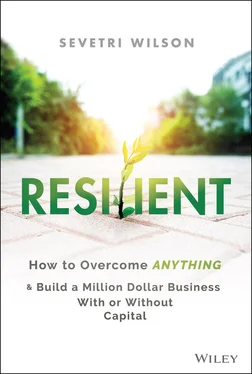So, in 2009 I started SGI; we were a strategic communications and management agency with an arm called SGI Cares, which helped nonprofit organizations and grant makers such as the W.K. Kellogg Foundation provide capacity support via technical assistance to the organizations that they fund.
For nonprofits, we were acting as their back office in lieu of full-time employees. In my clients, I'd meet some of my biggest champions like Raymond Jetson the President and CEO of Metromorphosis, a nonprofit with a mission to transform urban communities from within.
When I first started SGI I didn't have employees. We were a true professional services agency and because of this we were able to stay very lean as a business. I began creating marketing materials (trust me, nothing fancy at all). One underutilized resource I leaned on was using our local state economic development office. There I was able to use state-funded programs to cover the cost of items I needed to start my business, such as marketing and collateral materials. I participated in programs that can be found within every state. In Louisiana it was called Economic Gardening. I'm pretty certain that at the time we went through this program, we were not as large as the other businesses. But we were able to take advantage of consultants to discuss opportunities related to sales, operations, and understanding our competitive landscape. Having experienced individuals to even just talk through my ideas with and get feedback from was a game changer. I always urge small businesses to take advantage of their local, state, and federal programs and the free resources they provide; if nothing else, at least find out what exists.
There are many ways to build a business. When I started SGI, there was so much I didn't know. I was so green, from state filing docs to understanding the operational and legal jargon to writing winning proposals that would ultimately land me my first clients.
There is truth to the saying “you don't know what you don't know.” This is the case for all of us when it comes to a subject matter that is unfamiliar to us. SGI was a strategic communications and management agency. Early on we heavily specialized in nonprofit management, hence where the idea for Resilia came from.
Some of the projects we took on then, I'd never touch today. I'm just being honest.
I know there is a lot of talk about getting your value and what you are worth. But when you are just starting out, and you are trying to get clients and prove yourself, as well as figure out your pricing, it's very possible there will be times you undercut yourself. Sometimes it will be worth it and other times not so much.
As I began to establish my credibility and footing, everything around me began to increase, including my rates.
One thing in business you'll have to look out for is “upside-down contracts.” This is where your cost to do the work exceeds the price you are charging, and thus your business loses money in the execution of the work. These types of agreements are easier to recover from when it's just you working on a project, but when you layer employees or other hired consultants on top it can be difficult to recover from.
A few years into my business, I started resigning from contracts because of this. Not because the clients were horrible, but because they didn't make economic sense. One of my close advisors told me a long time ago that you get into business to make a profit. This may be your first reason, or it may be one of many reasons after the initial passion and your purpose drives you to start it. Either way, it's a business for a reason.
As SGI started to grow, we started to reevaluate SGI Cares, the arm that focused solely on nonprofits. SGI was growing—a very uncomfortable growth, but growing nevertheless. A few years in, we had landed our first seven-figure, multi-year contract with a healthcare provider seeking to provide Medicaid services via a government contract. They found us through a state website that listed Hudson initiative–approved companies. The program encourages state agencies to contract with certified small businesses, as well as encouraging contractors who receive contracts from the state to use good-faith efforts to utilize certified small businesses in the performance of the contract. If that contract taught us anything, it was the importance of cash flow and billing. When you are dealing with government contracts and large agencies, the billing cycles are much longer. Yet, because of the size of the contract, you have to hire employees and/or contractors to do the work. We also had to execute media buying and other vendor purchases as an agreement of the contract. It's very important to have someone, if not yourself, who knows the intricacies of buying media and appropriately running a tight ship with budgeting and billing. Otherwise, this can cause various headaches, from delayed payments from the client to your business struggling to meet important deadlines such as payroll because you're awaiting payment.
So, as SGI continued to grow I decided that we needed to go in a different direction with our SGI Cares arm. Via this arm, we were serving nonprofits in various ways. But not all nonprofits are created (or treated) equal, and many struggle to find additional room in their budgets to hire consultants. When they do, consultants can find themselves wanting to go above and beyond to help the nonprofit organization, because they can really get drawn into the work. As SGI began to grow we no longer had the capacity to service nonprofits in the way we had become accustomed to; when you're acting as a back office it's very natural that circumstances change and that the workload changes as well. So, I started thinking about ways we could continue to support these entities.
I really began to think about the future of our space as I saw it: software as a service.
We were providing a service and we began to think about how we could productize that service and deliver it through a software solution. We are seeing technology being evolved for various sectors by the experts in those sectors, thus what a technology founder once looked like is changing. Experts in their particular area of expertise are thinking about how they can create technology solutions for their antiquated sector in order to evolve it through the use of technology, and simplify a lot of the problems that they're having through solution-based products.
So, I began to think about how I could do this in the nonprofit and philanthropy sector, and ultimately how this technology could extend into other verticals such as government.
Yet, the first service that we took a stab at productizing was one that we offered under SGI Cares, called nonprofit creation services. We were helping nonprofits go through tedious paperwork to file for incorporation and exemption for their nonprofit, which today we call formation services.
We had created a system, and were receiving referrals from attorneys and accountants and other clients to provide this service. We were working with schools. We were working with health clinics. Many of them came to us because they wanted to create a nonprofit arm; the same for small businesses, restaurants—you name it.
And so we felt that there was perhaps an opportunity to create technology around this service, as we were doing it manually, which was very time-consuming. Then people were coming to us because they had tried their luck with products like LegalZoom which was heavily focused on just prepping the services, and customers still had no idea what to do next.
So as we continued to think about how we could release the manual touches that we were having with this service, productization seemed like the most likely solution. In November 2016, we launched what was then called Exempt Me Now to the public. We were doing something really simple and that was productizing or “TurboTaxing,” as we would say, the process of incorporation and exemption nonprofits. We launched the product in all 50 states, allowing our customers to now go online and “do it yourself, but not by yourself.”
Читать дальше












